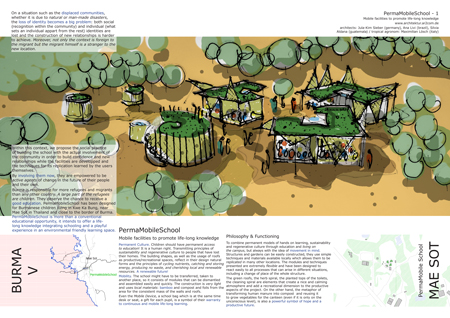On a situation such as the displaced communities, whether it is due to natural or man-made disasters, the loss of identity becomes a big problem: both social (recognition within the community) and individual (what sets an individual appart from the rest) identities are lost and the construction of new relationships is harder to achieve. Moreover, not only the context is foreign to the migrant but the migrant himself is a stranger to the new location.
Within this context, we propose the social practice of building the school with the actual involvement of the community in order to build confidence and new relationships while the facilities are developped and the techniques for its replication learned by the users themselves.
By involving them now, they are empowered to be active agents of change in the future of their people and their own.
Burma is responsible for more refugees and migrants than any other country. A large part of the refugees are children. They deserve the chance to receive a good education. PermaMobileSchool has been designed for Burmanese children living in Kwe Ka Bung, near Mae Sot in Thailand and close to the border of Burma. PermaMobileSchool is more than a conventional educational opportunity, it intends to offer a life-long knowledge integrating schooling and a playful experience in an environmental friendly learning space.

Design by Jula-Kim Sieber, Ana Livi, Silvia Aldana and PermaCultural input by Maximilian Lösch.